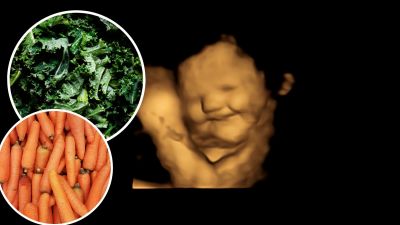Durham University researchers find babies make 'cry' faces in the womb when mothers eat kale

Scientists at Durham University have used the flavours of carrot and kale to learn more about how babies react to the diets of their mothers while in the womb.
Researchers at the Fetal and Neonatal Research Lab looked at how unborn babies in the womb responded to flavours a short time after they were eaten by their mother.
Exposing the fetuses of 100 pregnant women to the flavours of both carrot and kale, they used 4D ultrasound technology to capture the reactions from within the womb.
During the study, mothers were given a capsule containing approximately 400mg of carrot or 400mg kale powder about 20 minutes before their scan.
Carrots fared better, with the unborn babies producing more "laughter-faces" while those who were exposed to kale showed more "cry-face" expressions.
The facial reactions found in both groups, when compared with those in a control group who were not exposed to either flavour, showed that even a small amount of either flavour was enough to stimulate a reaction from the fetus.
It is hoped the findings will give us more clues about how human taste and smell receptors develop.
Researchers also suggest that what pregnant women eat could shape their babies' taste preference after birth.
The study was carried out alongside scientists from Aston University in Birmingham and the National Centre for Scientific Research-University of Burgundy in France.
Lead researcher Beyza Ustun said: “A number of studies have suggested that babies can taste and smell in the womb, but they are based on post-birth outcomes while our study is the first to see these reactions prior to birth.
“As a result, we think that this repeated exposure to flavours before birth could help to establish food preferences post-birth, which could be important when thinking about messaging around healthy eating and the potential for avoiding ‘food-fussiness’ when weaning.
“It was really amazing to see unborn babies’ reaction to kale or carrot flavours during the scans and share those moments with their parents.”
Professor Nadja Reissland, head of the Fetal and Neonatal Research Lab, said: “Previous research conducted in my lab has suggested that 4D ultrasound scans are a way of monitoring fetal reactions to understand how they respond to maternal health behaviours such as smoking, and their mental health including stress, depression, and anxiety.
“This latest study could have important implications for understanding the earliest evidence for fetal abilities to sense and discriminate different flavours and smells from the foods ingested by their mothers.”
Researchers say their findings might also help shape the information provided to mothers about the importance of taste and healthy diets while pregnant.
They will now carry out a follow-up study with the same babies once they are born to see if the influence of flavours they experienced in the womb affects their acceptance of different foods.
Want a quick and expert briefing on the biggest news stories? Listen to our latest podcasts to find out What You Need To know...